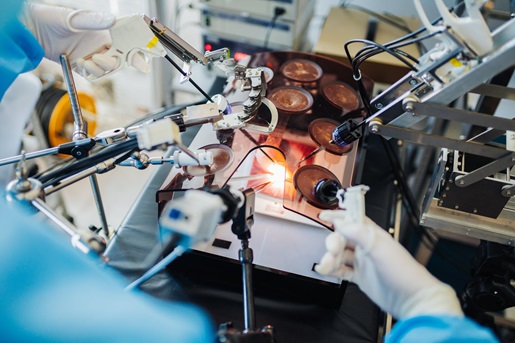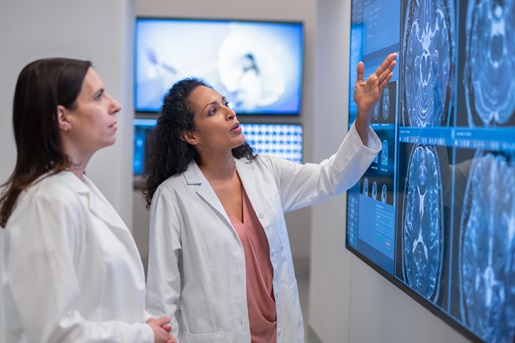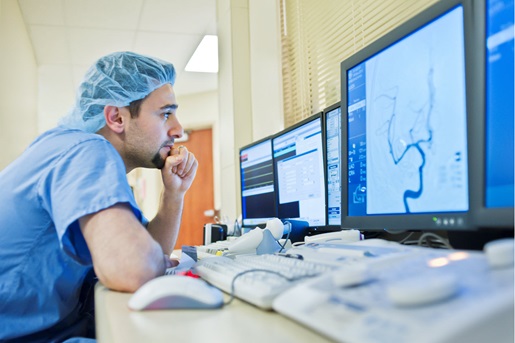There are many prominent examples of AI in healthcare, from improved patient diagnoses to more efficient drug discovery.
If you're looking for examples of AI in healthcare, then you don't need to look far. Artificial intelligence has been part of the medical field for decades and researchers are constantly discovering new ways to leverage it. At first, AI was simply a way for computers to help clinicians diagnose patients. Now, AI plays a key role in discovering drugs, developing treatment plans, and even powering sophisticated robots.
Now that generative AI is available for widespread use, interest in this innovative technology is higher than ever. Whether you treat patients directly or work behind the scenes, here are some real-world examples of AI usage in healthcare.
Need help picking the right scanner for your transition to AI-powered healthcare? Check out our post, AI in Healthcare: The Complete Guide.
What are some examples of AI in healthcare?
When it comes to AI in healthcare, examples are plentiful. That's because the medical field has employed AI technology since 1971. The first healthcare AI was called INTERNIST-1, and it used computer algorithms to deduce probable diagnoses for patients.
In the last five decades, computers have become cheaper, smaller, and exponentially more powerful. Medical AI used to be restricted to one program at a single university. Now, it permeates every corner of the healthcare field.
Assisted diagnosis
Clinicians have been using AI to help diagnose patients for more than 50 years. As such, the technology has become significantly more sophisticated over time. In the past, AIs such as INTERNIST-1 would simply weigh various vital signs and risk factors to come up with the most likely diagnosis. This couldn't account for each patient's individual physiology or medical history, however.
Now, medical AIs can make much more personalized predictions. Thanks to cloud computing, AIs can learn from enormous data sets, including medical images. At present, medical AIs can identify certain types of liver and kidney disease with up to 99% accuracy.
Treatment plan creation
In the past, clinicians would have to come up with treatment plans based on relatively broad criteria, such as a patient's age, sex, or weight. This meant having to make frequent, minor adjustments if the initial treatment proved ineffective. For cancer patients, where radiation is usually part of a treatment plan, that could mean severe, unnecessary pain.
For the last five years, the Princess Margaret Cancer Centre in Toronto has used AI algorithms to customize radiation treatments for its patients. The algorithm can create a treatment plan much faster than a human doctor can, and with potentially better results.
Medical robots
While robotics and AI are two distinct fields, the overlap between them can be considerable. Consider the case of medical robots, which are beginning to integrate adaptive AI technology.
Today, doctors can program robots to perform tasks during surgery. Companion robots for elderly or infirm individuals can interact with humans and "learn" behaviors over time. Smart prostheses can adapt to an individual's biology and movement patterns. Expect this field to grow considerably as the role of AI in healthcare evolves.
Drug discovery and development
Drug discovery and development is a particularly important AI application in healthcare. A 2022 paper in Artificial Intelligence Review outlined no fewer than 11 different ways that AI algorithms can help create, refine, and administer pharmaceuticals.
Using genomic data, AIs can predict how a drug might interact with the human body, down to the level of individual proteins. AI algorithms can also determine how well a given drug performed in a clinical trial, and even whether an existing drug might have secondary uses. As machine learning models improve, so should pharmaceutical-focused AIs.
Equipment manufacturing processes
The medical equipment manufacturing process helps demonstrate just how far applications of AI in healthcare have come. As of January 2024, the Food and Drug Administration has approved almost 700 AI-enabled medical devices for sale in the United States. These tools represent just about every field in healthcare, from clinical chemistry, to gastroenterology, to microbiology. The FDA expects the list of AI-enabled medical devices to keep growing in the future, particularly in radiology.
Did You Know?:The fi-8170 can scan up to 70 pages per minute and 10,000 pages per day. Click here to learn more.
Ethical AI application in healthcare
Now that we've explored some concrete examples of AI in healthcare, it's important to remember that AI is not an autonomous entity. Artificial intelligence requires human oversight, particularly in a field as sensitive as medicine.
First and foremost are the issues of transparency and privacy. If you intend to use patient data in a machine learning environment, you should inform the patient and give them the opportunity to opt out. Similarly, if a patient might require a medical device that collects biometric data, you should tell them exactly what data the device collects, and how you intend to use it.
Although AI has been around in the medical field for a long time, there is no universal ethical standard for using it. As such, you should defer to local laws, your organization's code of ethics, and your own best moral judgment. The UNESCO "Recommendation on the Ethics of Artificial Intelligence" may also be useful.
Did You Know?:The RICOH fi-8170 is a 2023 Future of Work Product of the Year Award winner, recognized as one of the “most innovative and disruptive products and solutions that have positively supported hybrid work experiences across the globe.” Learn more here.
Our recommendation: RICOH fi-8170
Perhaps you've been researching examples of AI in healthcare because you're ready to implement the technology in your own office. If that's the case, then digitizing your documents is a great first step. We take great pride in having spent the last 50+ years researching, designing, and developing some of the most advanced and powerful electronics in the world, including our professional grade fi and SP series of scanners.
Built to purpose for the most demanding document handling jobs, fi and SP scanners are capable of processing tens of thousands of pages per day at the highest levels of accuracy. Their intuitive integration capabilities with all existing work suites minimize time-to-value for businesses looking to invest in tools that will pay dividends for years to come.
The RICOH fi-8170 scanner is an excellent choice for healthcare practices, thanks to its rapid speed and high level of clarity. The device can scan up to 70 pages per minute at 600 DPI, which can be useful if you're looking to gather data for your own language model. There's also a manual scanning mode for everyday patient documents, such as driver's licenses and insurance cards. At 11.8 x 6.7 inches, it should fit easily on most office desks. Click here to learn more or shop the rest of our production scanner line.
Note: Information and external links are provided for your convenience and for educational purposes only, and shall not be construed, or relied upon, as legal or financial advice. PFU America, Inc. makes no representations about the contents, features, or specifications on such third-party sites, software, and/or offerings (collectively “Third-Party Offerings”) and shall not be responsible for any loss or damage that may arise from your use of such Third-Party Offerings. Please consult with a licensed professional regarding your specific situation as regulations may be subject to change.









